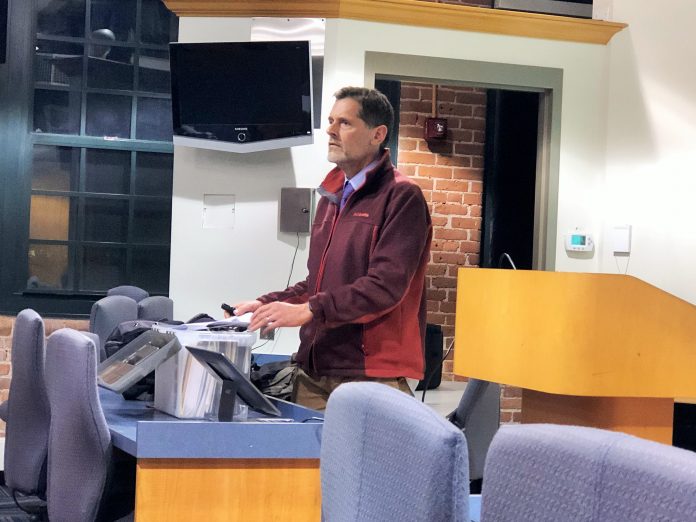
By Max Bowen-max.bowen@northstarreporter.com
Remember that old house down the road, the one dating back to 1806? Well, it’s a coffee shop now.
It’s a situation that happens often—homes or buildings that play a strong role in a town’s history are torn down to make way for new housing or businesses. Because of this, structures that date back to the 1600s and 1700s are now few and far between.
Should a town want to hold onto that piece of the past, it’s the Demolition Delay Bylaw that can provide the best opportunity. Chris Skelly—Director of Local Government Programs for the Mass Historical Commission–led a forum organized by the town’s Historical Commission that took an in-depth look at the bylaw. Members of the Harvard, Franklin, and Framingham historical commissions were in attendance, among others.
“It gives a window of opportunity to try and save something, but it doesn’t promise anything,” said Skelly. “I hear a lot of complaints that the bylaw isn’t saving buildings. That’s not what it’s supposed to do.”
In most cases, these bylaws call for a six to 18-month delay in development for any properties that meet certain criteria. These include the age of the building, its listing on the National Register of Historic Places, or a similar list done by a local Historic Commission. There are some exceptions, such as Milton, which passed a 24-month delay in 2017, said Skelly. Approximately half the state has such a bylaw.
These bylaws prohibit demolition—or sometimes even renovation—of the building during the aforementioned period. During this time, towns can determine if they wish to purchase the building or find a party that wishes to do so and keep it as close as possible to the original design. It’s also possible to speak to the developer, said Skelly, and form a compromise. He added that it helps if residents are be involved in the process.
“If they [residents] speak up, oftentimes they can make things happen,” said Skelly. “They’ve got to be involved.”
Another tool is for the matter to be publicized in the media. Skelly said that in Eastham, a historic house was purchased and preserved after the town put notices in the local paper.
Skelly said that proactive efforts are needed, that the delay bylaw is a reactive one. Proactive tools include developing historic districts, planning by the Historical Commission, and being aware of how zoning changes can put previously protected homes at risk.
In North Attleborough, the delay is six months and applies to buildings 80 years or older. It’s also for sites on the National Register or recommended for inclusion. Skelly said that six-month delays aren’t always effective, as it gives little time to go through the lengthy process of saving a site.
“A longer time gives you a longer window of opportunity to save the building,” said Skelly.
North Attleborough has 10 National Register Historic Districts which offer some protectionand are overseen by the National Park Service. According to the MHC web site, if there is no state or federal involvement in a project [such as federal licenses, permits, or funding] and no pertinent local or regional regulations [such as a local historic district] then listing in the National Register does not in any way limit an owner’s handling of the property. There are over 900 such districts in Massachusetts.
In general, local historic districts are far more effective at preventing inappropriate changes than a National District. In a local district, the Historical Commission would review proposed changes to exterior architectural features visible from a public way. North Attleborough has no such district, said Commission Chairperson Susan Taylor. One could be formed through a two-thirds vote by the city council or Town Meeting, according to the MHC.
“A local historic district offers far greater preservation protection and are often established as part of the community recognizing the significance and vulnerability of their architectural assets,” said Taylor.
